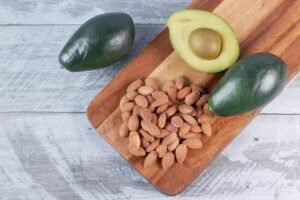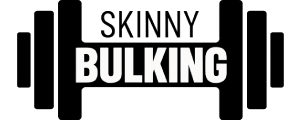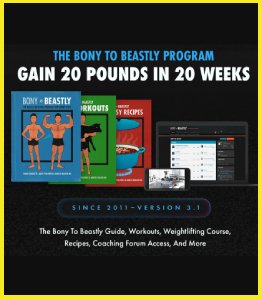For skinny guys who want to build muscle, it can be challenging to know where to start. While going to the gym and lifting weights is essential, it’s not the only thing you need to do to build muscle effectively. Your diet plays a significant role in your muscle-building journey. The key is to ensure that you are getting enough calories and nutrients to support muscle growth. In this post, we will give you tips and tricks on how to create the ultimate muscle-building diet that will help you reach your goals. We’ll cover everything from protein intake and meal timing to the best foods to incorporate into your diet. Whether you’re a beginner or an experienced gym-goer, this guide will help you take your muscle-building to the next level. So, get ready to transform your diet, and let’s get started!
1. Understand the importance of diet in muscle building

Image: pexels
When it comes to building muscles, most people think that exercising is the most important factor to consider. However, what many don’t realize is that diet plays an equally important role in muscle building.
In fact, your diet can make or break your muscle-building goals. To gain muscle, you need to consume more calories than you burn. This is called a calorie surplus. Consuming fewer calories than you burn will result in weight loss, which is great if that is your goal, but not ideal if you’re trying to build muscle.
In addition to consuming more calories, you also need to ensure that you’re getting enough of the right nutrients to fuel your body for muscle growth. This includes getting enough protein, carbohydrates, and healthy fats.
Protein is the building block of muscles, and you need to consume enough of it to repair and grow your muscles after a workout. Carbohydrates are important for providing your body with energy, which you need for your workouts. Healthy fats are essential for overall health and can also help to boost your testosterone levels, which is important for muscle growth.
To sum it up, understanding the importance of diet in muscle building is crucial. Consuming the right amount of calories, protein, carbohydrates, and healthy fats can help you build muscle faster and more efficiently. So, if you’re a skinny guy looking to bulk up, start paying attention to what you eat and make sure you’re fueling your body for maximum success.
2. Calculate your caloric needs and macronutrient ratios
When it comes to building muscle, getting your diet right is crucial. In order to gain muscle mass, you need to consume more calories than you burn. This is known as a calorie surplus.
Calculating your caloric needs can be done using an online calculator or by working with a registered dietitian or a personal trainer. Once you know how many calories you need to consume to gain weight, the next step is to determine the right macronutrient ratios for muscle building.
Macronutrients are the three main nutrients that make up our diet – protein, carbohydrates, and fat. Protein is essential for muscle growth and repair, while carbohydrates provide the energy needed for intense training sessions. Fat is also important for overall health and hormone production.
A common macronutrient ratio for muscle building is 40% carbohydrates, 30% protein, and 30% fat. However, this may vary depending on your individual needs and preferences. Some people may benefit from a higher protein intake, while others may do better with a higher carbohydrate intake.
Tracking your macronutrient intake is important to ensure that you are getting the right balance of nutrients for muscle building. There are many apps and online tools available that can help you track your macros and make sure you are hitting your goals.
By calculating your caloric needs and macronutrient ratios, you can create a muscle-building diet that is tailored to your individual needs and goals. With the right nutrition plan in place, you’ll be able to maximize your muscle growth and achieve the physique you’ve always wanted.
3. Incorporate protein-rich foods into your diet
Protein is the building block of muscle tissue, and consuming enough of this nutrient is essential for building muscle mass. Incorporating protein-rich foods into your diet can help you achieve your muscle-building goals. Aim to consume at least one gram of protein per pound of body weight daily.
Lean meats like chicken, turkey, beef, and fish are excellent sources of protein, as are eggs and dairy products like Greek yogurt and cottage cheese. Vegetarians and vegans can also get their protein fix from plant-based sources such as tofu, lentils, quinoa, and beans.
It’s important to spread your protein intake throughout the day, rather than consuming large amounts in one sitting. This will help your body to better utilize the protein and avoid excessive amounts being stored as fat. Try incorporating protein into each meal and snack, such as adding Greek yogurt to your breakfast, snacking on edamame, or having a protein shake post-workout.
Additionally, consider the timing of your protein intake. Consuming protein before and after workouts can help to maximize muscle growth and repair. A protein-rich meal or snack before bed can also help to prevent muscle breakdown during the overnight fasting period. By incorporating protein-rich foods strategically into your diet, you can help to optimize your muscle-building efforts.
4. Tips for choosing the right carbohydrates
When it comes to building muscle, carbohydrates are an essential part of the equation. They provide the body with the energy needed to fuel intense workouts and help to replenish glycogen stores in the muscles after exercise. However, not all carbohydrates are created equal and it’s important to choose the right ones if you want to maximize your muscle building potential.
Firstly, opt for complex carbohydrates rather than simple ones. Complex carbohydrates, such as sweet potatoes, brown rice, and whole-grain bread, are digested more slowly than simple carbohydrates like white bread and candy. This means that they provide a steady release of energy over a longer period of time, helping to keep you feeling full and energized for longer.
Secondly, choose carbohydrates that are high in fiber. Fiber not only helps to keep you feeling full and satisfied, but it also slows down the digestion process, which means that the carbohydrates are released more slowly into the bloodstream. This helps to prevent spikes in blood sugar levels, which can lead to energy crashes and cravings for sugary snacks.
Finally, pay attention to portion sizes. While carbohydrates are an important part of a muscle-building diet, it’s important not to overdo it. Aim for a portion size that’s roughly the same size as your fist and try to eat carbohydrates in combination with protein and healthy fats to help you feel fuller for longer and support muscle growth.
5. Healthy fats and their role in muscle building

Image: pexels
When it comes to muscle building, most people think of protein as the most important nutrient. However, healthy fats are also an essential component of a muscle-building diet, especially for skinny guys who struggle to gain weight and muscle mass.
Healthy fats such as avocados, nuts, olive oil, and fatty fish like salmon are not only calorie-dense, but they also provide numerous health benefits. They help to regulate hormone production, improve joint health, and reduce inflammation, all of which are important for muscle growth and recovery.
Eating a diet rich in healthy fats can also help increase your energy levels and stamina, allowing you to push harder during your workouts and build more muscle over time.
It’s important to note that not all fats are created equal, and some types of fats should be avoided if you’re trying to build muscle. Trans fats and saturated fats found in processed foods, fried foods, and baked goods can actually harm your health and inhibit muscle growth.
Therefore, it’s essential to focus on incorporating healthy fats into your diet and avoiding unhealthy ones to get the most out of your muscle-building efforts. Aim to get at least 20-30% of your daily calories from healthy fats to support your muscle-building goals.
6. Timing of meals and snacks for optimal muscle growth
Timing your meals and snacks is crucial for optimal muscle growth. Consuming the right nutrients at the right time can maximize your gains and help you achieve your muscle-building goals faster.
Your body needs a constant supply of nutrients to support muscle growth and repair. This means that you should aim to eat every 2-3 hours, even if it’s just a small snack. This will help keep your energy levels stable and prevent muscle breakdown.
It’s also important to consume a meal or snack containing protein and carbohydrates within 30 minutes of completing your workout. This will help replenish glycogen stores and kickstart the muscle repair process.
In addition, consuming a slow-digesting protein before bed, such as casein, can help prevent muscle breakdown during sleep and support muscle growth overnight.
Don’t forget to stay hydrated throughout the day as well. Aim for at least 8-10 glasses of water per day, and consider sipping on a protein shake during your workout to fuel your muscles and prevent dehydration.
Overall, timing your meals and snacks is just as important as the content of your diet when it comes to building muscle. Make sure to plan ahead and schedule your meals and snacks appropriately to maximize your muscle-building potential.
7. Hydration for muscle building
Hydration is underrated when it comes to muscle building. Water is essential for the proper functioning of our body and not drinking enough water can lead to dehydration, which can affect muscle recovery and growth. When we work out, we lose a lot of fluids through sweat, and it’s important to replenish those fluids to maintain optimal hydration levels.
Drinking water before, during, and after a workout can ensure that you stay hydrated and help prevent muscle cramps and fatigue. A good rule of thumb is to drink at least 8-10 glasses of water per day. You can also drink sports drinks that provide electrolytes, which are minerals that help maintain proper fluid balance in the body.
Another way to stay hydrated is to eat water-rich foods such as fruits and vegetables. Foods like watermelon, cucumbers, and strawberries have a high water content and can help keep you hydrated throughout the day.
In addition to drinking enough water, it’s important to avoid diuretics such as caffeine and alcohol, which can dehydrate your body. Avoiding these drinks or limiting your intake can help ensure that you stay hydrated and on track with your muscle building goals.
8. Meal prep and planning for success
Meal prep and planning is an essential part of any muscle-building diet plan. By planning your meals in advance, you can ensure that you are meeting your daily macronutrient goals and consuming the right amount of calories. This will help you to build muscle mass and minimize fat gain.
Start by calculating your daily caloric requirements and macronutrient ratios. Then, create a meal plan that includes a variety of protein sources, complex carbohydrates, and healthy fats. Plan to consume several small meals throughout the day, rather than a few large ones, to keep your metabolism elevated and your muscles fueled.
Once you have your meal plan in place, it’s time to start prepping your meals. This could include cooking your proteins in advance, chopping vegetables, or portioning out snacks for the week. Investing in some meal prep containers can make it easier to portion out your meals and transport them to work or the gym.
By taking the time to plan and prep your meals in advance, you will be less likely to succumb to unhealthy snacking or fast food options when you’re pressed for time. This will help you to stick to your muscle-building diet plan and achieve maximum success.
9. Supplements to consider for muscle building

Image: pexels
While supplements are not the be-all and end-all of muscle building, they can certainly help in providing an extra boost. Here are some supplements to consider when looking to build muscle:
1. Protein powder: Protein is the building block of muscle and it can be difficult to consume enough from food alone. Protein powders are a convenient and effective way to increase your protein intake.
2. Creatine: Creatine is a molecule that helps to produce energy during intense workouts. It can help to increase muscle mass and strength, and also aids in recovery.
3. Beta-alanine: Beta-alanine is an amino acid that helps to reduce fatigue during high-intensity exercise. It works by buffering lactic acid in the muscles, which can delay muscle fatigue and allow for longer and more intense workouts.
4. Fish oil: Fish oil is rich in omega-3 fatty acids, which have been shown to reduce inflammation and improve recovery. It can also help to increase muscle protein synthesis, which is crucial for muscle growth.
5. Vitamin D: Vitamin D is important for overall health and also plays a role in muscle function. It has been shown to increase muscle strength and size, especially when combined with resistance training.
While supplements can be helpful, it’s important to remember that they should be used in conjunction with a healthy diet and exercise program. They are not a substitute for hard work and dedication in the gym and the kitchen.
10. Be consistent and patient with your muscle building diet plan
Consistency and patience are key when it comes to building muscle. It’s important to remember that progress takes time and there are no shortcuts. You need to be consistent with your muscle-building diet plan and stick to it in the long run to see results.
It’s important to track your progress and make adjustments to your diet and exercise routine as needed. This will help you stay on track and make sure you are making progress towards your goals.
Another thing to keep in mind is that muscle building is not just about what you eat, but also how you eat. Eating enough calories and protein is important, but so is timing your meals properly. Eating smaller, more frequent meals throughout the day can help keep your metabolism revved up and your body in an anabolic state, which is essential for muscle growth.
Remember that building muscle is a marathon, not a sprint. Don’t get discouraged if you don’t see results right away. Stick to your plan, be consistent, and stay patient. With dedication and hard work, you will see progress over time and achieve your muscle building goals.







Leave a Reply